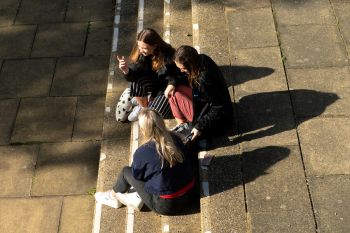How students helped under-represented groups succeed in higher education
Posted on behalf of: Student Communications
Last updated: Monday, 23 September 2024

Our Access and Participation Plan (APP) sets out how we will improve equality of opportunity for under-represented groups to access, succeed in and progress from higher education.
Input from our student community is essential for developing a plan and interventions that work for you. That’s why last year we set up our student panel and it’s also why we worked closely with the University of Sussex Students’ Union (USSU) to ensure that students were able to input into the development of our new APP (2025-29), which has now been submitted to the Office for Students.
Hearing from students
Focus groups were organised by the USSU for students to discuss their experiences at university in relation to the APP. Five groups were organised so that the students who the interventions were intended to support were able to give their feedback. These allowed us to hear directly from students about how the University is delivering on supporting those groups and where we need to do better.
It has been invaluable to engage with students in the design of our interventions as this has enabled us to ensure that we can develop activities in a way that will potentially have the greatest impact. For example, it was highlighted that there can be a lack of awareness of available academic support and some students expressed a desire for more diverse perspectives in teaching. These insights have influenced our plan to reduce the ethnicity awarding gaps with initiatives now in place to further develop the Race Equity Advocate Project, and to introduce Curriculum Change Connectors aimed at fostering a more inclusive academic environment.
Thank you to all students who took part in Focus Groups last year. Your feedback and shared experiences have been vital in making sure we get this plan right.
Developing intervention strategies
Further focus groups were held to provide feedback on three of a range of proposed ‘intervention strategies’ - activities intended to help meet the objectives of the APP. These included supporting children who have experience of care to access higher education, our ResLife Connector programme, and a new Global Remote Internships programme.
Access to Higher Education
For children with experience of care, we aim to increase their access to higher education through on-campus events, subject taster days, and activities focused on building confidence and resilience. Feedback affirmed the importance of in-person sessions to boost confidence and provide first hand experience of student life, with a focus on adaptability to cater to different needs, including disabilities and neurodivergence.
On-course Success
The ResLife Connectors programme, designed to support mental health and wellbeing of students while at university, received constructive feedback. The potential benefits of social events for community engagement and wellbeing were acknowledged, particularly for low-income and marginalised groups. The programme will include kitchen meetings, door knocking, events, and conflict resolution, with plans for a robust evaluation to enhance its impact.
Progression from Higher Education
Our new Global Remote Internships programme aims to support students to achieve good graduate outcomes. Feedback highlighted the value of a hybrid model, inclusive marketing, and the importance of mentor training and logistical support. This programme is being developed with these insights in mind and includes bursary payments to support 110 students annually.
What happens next?
We have now submitted our proposed APP (2025-29) to the Office for Students and expect their feedback in the coming weeks. Meanwhile, we will continue collaborating with the Students’ Union to involve students, and work with the entire University community to support students from under-represented backgrounds.
